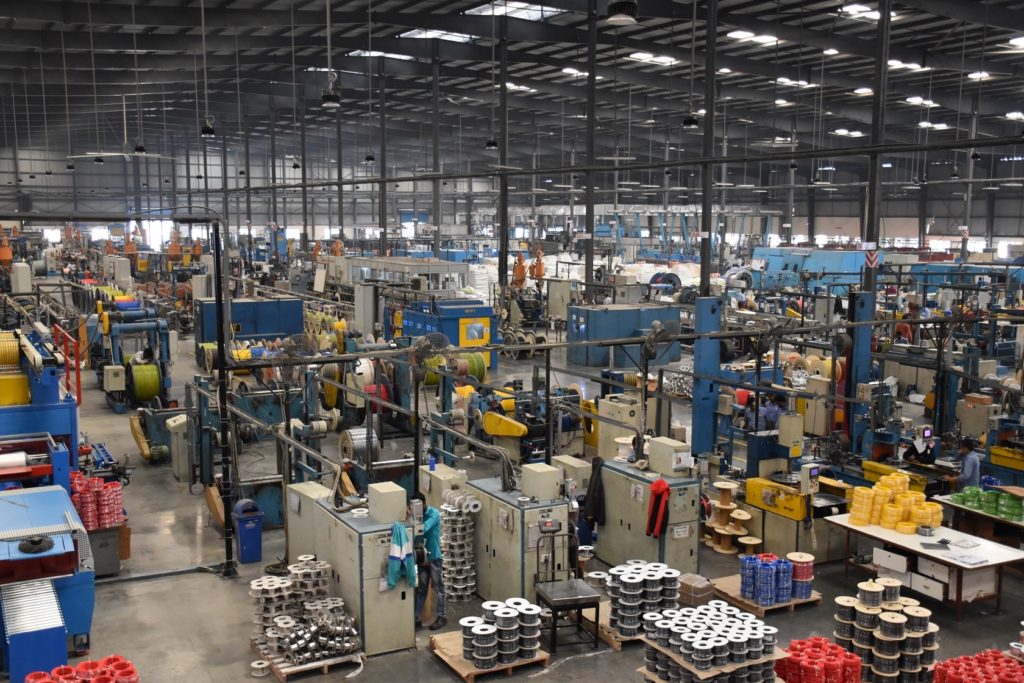In today’s rapidly evolving business landscape, contract manufacturing has become a cornerstone strategy for companies looking to optimize their production processes while maintaining competitive advantages. This comprehensive guide to contract manufacturing explores the various aspects of contract manufacturing, from its fundamental concepts to its profound impact on modern supply chain management.
Key Takeaways
- Contract manufacturing enables small businesses and entrepreneurs to launch products without heavy infrastructure investment, providing access to professional-grade equipment and expertise while preserving capital for growth initiatives.
- Different types of contract manufacturing services (private label, component, end-to-end) offer flexible solutions for various business needs, allowing companies to choose the most suitable model for their product development stage.
- Quality management is crucial in contract manufacturing relationships, requiring robust control processes, clear documentation, and regular audits to maintain product consistency and meet regulatory standards.
- Digital integration and advanced technologies in modern contract manufacturing enhance supply chain visibility, enable real-time monitoring, and improve production efficiency while maintaining quality control.
- Risk management strategies, including intellectual property protection and supply chain diversification, are essential for successful contract manufacturing relationships, particularly for small and medium-sized businesses entering new markets.
Understanding Contract Manufacturing Agreements
Before entering into a contract manufacturing agreement, companies must carefully evaluate potential contract manufacturers and establish clear terms. The contract manufacturing agreement should outline quality control processes, intellectual property rights, and delivery schedules. This manufacturing process requires careful consideration of how contract manufacturers provide value and ensure consistent quality throughout the production cycle.
Transitioning from In-House Production
Many companies choose to use contract manufacturing after evaluating the limitations of in-house production. While maintaining internal manufacturing facilities offers direct control, outsourcing production to third-party manufacturers often provides greater efficiency and scalability. Contract manufacturers provide specialized expertise and advanced manufacturing operations that might be cost-prohibitive to develop internally.
Role of Original Equipment Manufacturers
Original equipment manufacturers (OEMs) often partner with contract manufacturers to enhance their production capabilities. This relationship allows OEMs to focus on design and innovation while leveraging the mass production capabilities of established manufacturing facilities. Contract manufacturers work closely with OEMs to ensure products meet exact specifications and quality standards.
Key Industries and Operating Model
The scope of contract manufacturing spans across multiple sectors including the following:
- Electronics and telecommunications
- Pharmaceutical and medical devices
- Automotive and aerospace
- Consumer goods and retail
- Food and beverage production
- Industrial equipment and machinery
In a typical contract manufacturing arrangement, the manufacturing contract establishes clear parameters between the hiring company and the contract manufacturer. The process begins with the hiring company providing product specifications and requirements, followed by the contract manufacturer developing production processes and quality control procedures. Once production begins following approved protocols and standards, regular quality assurance checks ensure adherence to specifications before the contract manufacturer delivers finished products to the hiring company.
The Evolution of Contract Manufacturing
The manufacturing services landscape has evolved significantly over the past decades. What began as simple outsourced manufacturing arrangements has transformed into sophisticated partnerships that drive innovation and market growth. Modern contract manufacturing encompasses not just production, but often includes design collaboration, supply chain optimization, and even market expansion strategies.
Impact on Global Markets
Contract manufacturing has revolutionized how companies approach global markets. By partnering with contract manufacturers in different regions, businesses can effectively serve local markets while optimizing production costs. This global approach to manufacturing helps companies maintain competitive pricing while ensuring product quality meets regional standards and preferences.
Types of Contract Manufacturing
Contract manufacturing services come in several forms, each designed to meet specific business needs and production requirements. Understanding these different types helps companies choose the right contract manufacturer for their particular situation.
Private Label Manufacturing
Private label manufacturing represents one of the most common forms of contract manufacturing. In this arrangement, the contract manufacturer produces complete products that the hiring company sells under its own brand name. The manufacturing follows precise design specifications provided by the hiring company, enabling businesses to expand their product lines without investing in production infrastructure. This approach is particularly common in the following spaces:
- Consumer goods
- Cosmetics
- Food products

Component Manufacturing
Component manufacturing focuses on producing specific parts that integrate into larger products. This specialized manufacturing service is crucial for complex products requiring multiple components. The process typically involves production of individual components to exact specifications, rigorous quality control, and integration support with final assembly procedures. Specialized equipment and expertise for specific component types are essential elements of this manufacturing approach.
Individual Component Manufacturing Expertise
In addition to complete product assembly, many contract manufacturers specialize in individual component manufacturing. This expertise allows them to produce high-quality products while maintaining cost efficiency. The contract manufacturer performs specific manufacturing operations that require specialized equipment or expertise, enabling the hiring company’s brand to maintain consistent quality across all components.
Labor Subcontracting
Labor subcontracting provides companies with flexible workforce solutions while maintaining quality control over their manufacturing process. This approach helps manage labor costs and production capacity effectively by providing access to specialized skills and expertise, flexible scaling of the workforce based on demand, and reduced overhead costs related to permanent staffing.
End-to-End Manufacturing
End-to-end manufacturing represents the most comprehensive form of contract manufacturing, where the contract manufacturer handles the entire manufacturing process from raw materials to finished product. This approach offers complete management of the production cycle, integrated quality control procedures, supply chain management and optimization, and turnkey solutions for complex manufacturing needs.
Emerging Manufacturing Models
Recent developments in contract manufacturing have led to new hybrid models that combine different manufacturing approaches. These innovative arrangements allow for greater flexibility and customization in manufacturing partnerships. For instance, some contract manufacturers now offer a combination of component manufacturing and end-to-end services, allowing clients to scale their involvement based on specific product needs or market demands.
Technology Integration in Manufacturing Services
Modern contract manufacturing increasingly relies on advanced technologies to maintain efficiency and quality control. From artificial intelligence in quality assurance to Internet of Things (IoT) sensors in production monitoring, contract manufacturers are investing in cutting-edge solutions to enhance their manufacturing process and deliver superior results for their clients.
Key Advantages of Contract Manufacturing
The advantages of contract manufacturing extend beyond simple cost savings, offering strategic benefits that can transform business operations. Here are the primary benefits companies can expect:
Cost Efficiency
For entrepreneurs and small businesses, cost efficiency through contract manufacturing can make or break your growth journey. Instead of pouring your precious capital into expensive equipment and facilities, you can invest in what really drives your business forward: product development, marketing, and customer acquisition.
When you’re launching a new product line or scaling your existing brand, every dollar counts. Contract manufacturing lets you:
- Start production without massive facility investments
- Leverage experienced manufacturing teams without hiring costs
- Access professional-grade equipment and processes
- Keep more working capital for growth and marketing
Core Competency Focus
As a founder or small business owner, your time is your most valuable asset. Contract manufacturing frees you up to focus on what you do best: innovating, building your brand, and connecting with customers.
We’ve seen countless entrepreneurs transform their businesses by shifting focus from production headaches to growth opportunities. When you’re not managing manufacturing operations, you can concentrate on:
- Perfecting your product design and features
- Building your brand and marketing presence
- Developing strong customer relationships
- Expanding into new markets and channels
Flexibility & Scalability
Whether you’re launching your first product or expanding your line, the ability to scale quickly can make the difference between success and missed opportunities. Contract manufacturing gives you the flexibility to start small and grow big without the growing pains.
Imagine launching a product that goes viral on social media or lands a major retail deal. With contract manufacturing, you can:
- Start with small production runs to test the market
- Scale up quickly when demand spikes
- Adjust production based on seasonal needs
- Enter new markets without major infrastructure investments

Quality Management in Contract Manufacturing
Advanced Quality Control Processes
Successful contract manufacturing work depends on implementing robust quality control processes throughout the entire manufacturing process. From raw material inspection to final product testing, these processes ensure consistent quality across all production facilities. Contract packaging operations must adhere to the same stringent standards to maintain product integrity through the distribution chain.
Quality Assurance Systems
Successful contract manufacturing relationships depend heavily on robust quality assurance systems. These systems typically involve multiple layers of quality control, from incoming material inspection to in-process testing and final product verification. Contract manufacturers must maintain detailed documentation of all quality control procedures and results, ensuring transparency and traceability throughout the production process.
Certification and Compliance
Contract manufacturers must often maintain various certifications and comply with multiple regulatory standards. This is particularly crucial in industries like medical device manufacturing, aerospace components, and food production. The hiring company must verify that their contract manufacturer maintains all necessary certifications and regularly updates their compliance status.
Risk Management Strategies
Supply Chain Risk Mitigation
Effective risk management in contract manufacturing extends beyond basic quality control. Companies must develop comprehensive strategies to address potential supply chain disruptions, from raw material shortages to transportation delays. This often involves maintaining relationships with multiple contract manufacturers and developing contingency plans for various scenarios.
Intellectual Property Protection
While intellectual property concerns remain a significant consideration in contract manufacturing, companies have developed sophisticated strategies to protect their innovations. This includes not just legal agreements, but also physical security measures, data protection protocols, and careful compartmentalization of sensitive information across different contract manufacturers.
5 Industry-Specific Applications
- Medical Device Manufacturing
The medical device industry presents unique challenges and opportunities for contract manufacturing. Strict regulatory requirements, precision manufacturing needs, and rigorous documentation requirements make this sector particularly demanding. Successful contract manufacturers in this space must maintain clean room facilities, specialized equipment, and expert staff familiar with medical device regulations.
- Automotive Component Production
Automotive contract manufacturing has evolved significantly with the rise of electric vehicles and advanced driver assistance systems. Contract manufacturers in this sector must maintain sophisticated quality control systems, manage complex supply chains, and adapt to rapidly changing technological requirements. The ability to produce high-precision components while maintaining cost effectiveness is crucial.
- Consumer Electronics Assembly
The consumer electronics sector relies heavily on contract manufacturing to maintain competitiveness in a fast-moving market. Contract manufacturers must balance high-volume production capabilities with the flexibility to quickly adapt to new product introductions. This often requires significant investment in automated assembly systems and testing equipment.
- Aerospace Manufacturing Excellence
Aerospace companies require particularly sophisticated contract manufacturing capabilities. The contracting company must maintain specialized certifications and demonstrate expertise in precision manufacturing. This sector demands exceptional attention to detail and adherence to strict regulatory requirements.
- Electronic Manufacturing Services
The electronic manufacturing services sector continues to evolve with technological advances. Contract manufacturers in this field must maintain state-of-the-art facilities and expertise in various assembly techniques. This specialized focus helps simplify supply chain management for electronics companies while ensuring product quality.

Supply Chain Optimization
Digital Integration
Modern contract manufacturing increasingly relies on digital integration throughout the supply chain. This includes real-time inventory tracking, automated ordering systems, and integrated production scheduling. Such digital transformation enables better coordination between hiring companies and their contract manufacturers, leading to improved efficiency and reduced lead times.
Sustainability Considerations
Contract manufacturing plays a crucial role in helping companies achieve their sustainability goals. This includes implementing environmentally friendly manufacturing processes, reducing waste, and optimizing transportation networks to minimize carbon footprint. Many contract manufacturers now offer specialized services focused on sustainable production methods and materials.
Supply Chain Resilience
The key elements for optimizing supply chain operations include:
- Flexible manufacturing networks with multiple production locations
- Scalable capacity and rapid response capabilities
- Integrated inventory optimization strategies
- Advanced demand forecasting systems
Future Trends in Contract Manufacturing
The future of contract manufacturing continues to evolve with technological advances and changing market demands. Contract manufacturers are increasingly investing in advanced robotics, automation systems, collaborative robots for flexible manufacturing, automated quality inspection systems, smart factory implementations, and predictive maintenance capabilities.
Global Market Dynamics
Understanding regional manufacturing strengths and challenges helps companies optimize their contract manufacturing relationships. Different regions offer varying advantages in terms of cost, expertise, and market access. Companies must carefully evaluate these factors when selecting contract manufacturing partners.
Conclusion: Maximizing Contract Manufacturing Success
The success of contract manufacturing relationships depends on careful planning, clear communication, and robust management systems. Companies must approach contract manufacturing as a strategic partnership rather than just a service arrangement. By carefully selecting partners, maintaining clear quality standards, and implementing effective communication channels, businesses can leverage specialized skills to achieve significant competitive advantages in their markets.
As companies evaluate whether to use contract manufacturing, they should consider how contract manufacturing helps optimize their operations and improve market competitiveness. By carefully selecting manufacturing partners and leveraging specialized skills effectively, businesses can achieve significant advantages in their respective markets.
As the manufacturing landscape continues to evolve, companies that effectively utilize contract manufacturing will find themselves better positioned to respond to market changes, maintain cost effectiveness, and focus on their core business strengths. The key lies in developing strong partnerships with contract manufacturers while maintaining the flexibility to adapt to changing market conditions and technological advances.

Frequently Asked Questions
What is contract manufacturing?
Contract manufacturing involves outsourcing the production of goods or components to a third-party manufacturer who adheres to your specifications.
Who benefits most from contract manufacturing?
Entrepreneurs, small businesses, micro-brands, and e-commerce sellers benefit by reducing upfront costs and gaining access to scalable production capabilities.
How can I protect my intellectual property when using contract manufacturing?
Ensure contracts clearly outline intellectual property ownership, and work only with reputable manufacturers who implement strong confidentiality protocols.
What challenges should I be aware of?
Common challenges include quality control, communication gaps, and intellectual property concerns. These can be addressed through clear agreements, regular audits, and strong partnerships.
Can contract manufacturing help my small business scale?
Yes, contract manufacturing provides flexibility and scalability, enabling small businesses to increase production as needed without investing in costly infrastructure.



